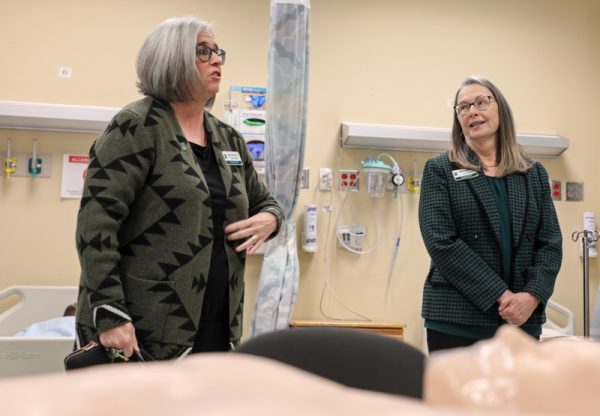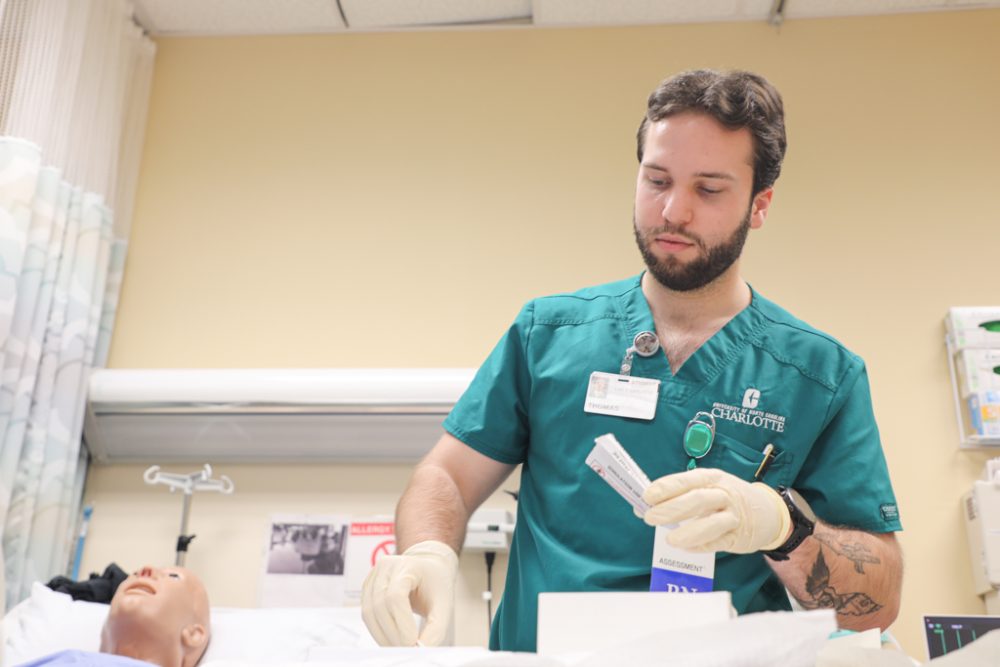Enrollment in New Nursing Program Exceeds Expectations

If you build it, they will come.
UNC Charlotte’s School of Nursing, within the College of Health and Human Services, has always been ready and willing to educate more nurses. It just didn’t have the resources to do so. Until now.
With a grant from the University of North Carolina System, UNC Charlotte will offer its first Accelerated Bachelor of Science in Nursing this fall.
The funds for the grant originated from the North Carolina General Assembly to help public universities produce more nursing graduates as the state is projected to have a shortage of up to 18,600 registered nurses over the next decade. Twelve North Carolina public universities were awarded grants. UNC Charlotte received $2.4 million.
“It takes a lot of time and energy to teach a student to become a nurse,” said Susan McLennon, Ph.D., director of UNC Charlotte’s School of Nursing. “And it takes a lot of money to create classrooms and hire clinical faculty.”
The Accelerated Bachelor of Science in Nursing is designed for students who already hold a degree in another discipline. “People are attracted to nursing, especially those with a strong science foundation who haven’t found a job in their field,” said Susan Lynch, Ph.D., clinical professor and associate director of undergraduate programs in the School of Nursing.
To help transfer and community college students, Lynch also opened the program to students who hold associate degrees from North Carolina schools.
The new program option is accelerated because it’s a continual enrollment for four sequential semesters (i.e., students attend in the summer). The curriculum, however, is the same as Bachelor of Science in Nursing. “It’s just packaged differently,” Lynch said. “We know our curriculum works. Our December 2024 Bachelor of Science in Nursing grads had a 100% pass rate on the National Council Licensure Examination. There’s no reason to tamper with success.”
Though other local schools have been offering an Accelerated Bachelor of Science in Nursing for years, UNC Charlotte’s degree is now the only public option in the region.
As soon as word got out about the University’s new program, even with little to no marketing, the applicants began to roll in. And they kept rolling in. Ninety people applied for just 16 slots before the School of Nursing had to close the application portal.
Watching the qualified applicant numbers increase, McLennon and Lynch quickly changed course and opened the new program to twice as many students as originally planned.
“We were shocked. We met our three-year goal in year one,” McLennon said. “I had originally proposed to start with 16 students in the fall of 2025 and then 24 the following year and then up to 32 by the beginning of the third year. But, we had an overwhelming response out of the gate.”
Cost may have been a contributing factor to the program’s instant popularity. Four-year tuition at UNC Charlotte is approximately $18,000 (not including the purchase of stethoscopes, scrubs, shoes, and other nursing supplies). Accelerated Bachelor of Science in Nursing programs at private and proprietary universities in the Charlotte area can cost four times that amount.

But there are other factors as well. “People are looking to nursing because there will always be jobs available,” Lynch said. “And it’s a career that allows you to do something for someone else. It’s rewarding.”
With a new program option comes the need for additional faculty, equipment, and space to run it. To prepare for the fall 2025 start date, grant funds have already been used to hire lecturers, a clinical assistant professor, and others, and to purchase exam tables, hospital beds, infusion pumps, and a patient simulator among other things. Funds will also go toward the construction of new nursing labs.
In addition, grant money is being used to expand the Family Nurse Practitioner program from 24 to 32 students per year and construct a new exam room for the program.
Though UNC Charlotte’s School of Nursing is dedicated to educating more nurses, and offers top-rated programs, it may not be enough to solve the bigger problem awaiting graduates in the workforce right now. “It’s a hard job,” McLennon said. “The ratio of nurses to patients is too high for them to provide the quality of care they want to provide, which adds up to them being burned out and leaving.”
Will more nurses result in less departures?
“Nurses are not only caregivers but also problem solvers and solution providers. They are essential to the health care system,” McLennon said. “It will be hugely beneficial to have more of them and we’re doing as much as we can with the resources we have to make that happen.”